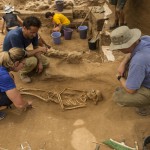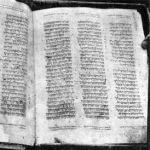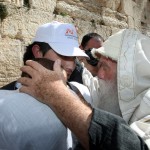
Sunset in Jerusalem.
In cities and villages throughout Israel, life seems to come to a standstill on Friday afternoons.
As the cool of the evening sweeps in, the Shabbat (Sabbath) begins, the seventh day — a day of rest and holiness.
The Hebrew word for this seventh day is shabbat (שַׁבָּת), which comes from the root verb shabat (שָׁבַת), meaning to cease, desist, rest.
Many Messianic Jews and Gentile Believers in Yeshua (Jesus), along with sabbath-keeping Christian denominations, such as Seventh Day Adventists join millions of Jewish people in Israel and around the world by setting aside this seventh day as holy.
They keep it holy in a variety of ways, primarily by ceasing from all regular work as one of the Ten Commandments instructs.
But is it important to keep Shabbat holy in the 21st century?

Jewish men and women stroll down Jaffa Road in Jerusalem on the Shabbat. (Photo by Nick Thompson)
God Worked for Six Days
Before understanding why and how God wants us to rest, we must first understand what it means to work.
“By the seventh day God had finished the work He had been doing; so on the seventh day He rested [shevat—ceased] from all His work [melakhah—workmanship, creative activity]. (Genesis 2:2)
God had just finished creating the heavens and the earth and all that was in it. That was His melakhah, one of the Hebrew words for work.
So, what is the melakhah (work) that God expects us to do for six days before Shabbat begins on Friday night?
One Orthodox Jewish writer described it as anything that “represents a constructive, creative effort” and that demonstrates a man or woman’s “mastery over nature,” which God gave us in Genesis 1:28.
Even though the work that each of us does is on a much smaller scale than what God accomplished, He expects us to create and master the resources that He gave us.
In fact, God says He will make us prosper (be blessed) through the work we do.
“… the Lord your God will bless you in all the work of your hand that you will do.” (Deuteronomy 14:29)
God even bestows blessings on the seventh day, itself.

A sunset over the Dead Sea in Israel. A day begins in the evening according to the Bible. (Genesis 1:3–5)
God Blessed the Seventh Day and Made It Holy
To bless something is to grant it special favor, honor, and privileges beyond other comparable things.
First, God granted special favor to the seventh day by giving it a unique name — Shabbat.
Every other day in the Tanakh is designated as Yom (Day) Rishon (1), Yom (Day) Sheni (2), etc. just as God identified the days of creation as the first day, second day, and so on.
However, Friday night to Saturday night is not called Day 7; it is just called Shabbat (Rest).
And God didn’t stop with giving Day 7 a unique name.
What higher honor could He give this day than to designate it as Holy.
“Then God blessed the seventh day and made it holy, because on it He rested from all the work of creating that He had done.” (Genesis 2:3)
To be holy is to be set apart, and that is exactly what the Shabbat is all about, being set apart.

The Sabbath is a powerful declaration that God is the Creator.
The seventh day has held a special place of honor in God’s heavenly calendar since the very first Sabbath of creation, before Adam and Eve even had a chance to disobey Him.
Whether or not Adam and Eve and the generations up to the time of Moses kept the Shabbat holy is up for debate.
But by the time God brought the Israelites out of slavery in Egypt, He made it a law — the fourth of the ten commandments.
“Remember the Sabbath day by keeping it holy. Six days you shall labor and do all your work [melakhah], but the seventh day is a Sabbath to the Lord your God. On it you shall not do any work [melakhah]…. For in six days the Lord made the heavens and the earth, the sea, and all that is in them, but He rested on the seventh day. Therefore the Lord blessed the Sabbath day and made it holy.” (Exodus 20:8–11; see also Leviticus 23:3,32 and Deuteronomy 5:12–14)
Imagine the joy that the Israelites felt when they received that commandment. They now only had to work 6 days!
As slaves in Egypt, they had been forced to work day in and day out. The Shabbat, on the other hand, offered them — and it offers each of us — an emancipation from the slavery of continual work, safeguarding the dignity of every worker.

Israel in Egypt (1867), by Edward Poynter depicts the enslavement of the Israelites under Pharaoh
Separating the Shabbat from Every Other Day
Setting the Shabbat apart from every other day protects our relationship with God, serving as a weekly reminder to us and it shows others that we belong to the Lord. We must always keep in mind that people are watching us:
“You are My witnesses,” declares the LORD, “that I am God.” (Isaiah 43:12)
To remember the Shabbat as a holy day (#4 of the Ten Commandments), the Jewish people recite a special blessing as Shabbat ends on Saturday evening:
“Blessed art thou, Lord our God, King of the Universe who distinguishes holiness from the ordinary, light from dark, Israel from the nations, the seventh day from the six days of work. Blessed art thou, Lord our God, who distinguishes holiness from the ordinary.”
Also in Jewish tradition, to help distinguish the Shabbat from the rest of the week, Shabbat ends with a special Havdalah (Separation) ceremony which ushers in the new week.
In the image below, a braided candle (right) is lit, spices in an ornamental spice box (left) are sniffed by those attending, and the Kiddush blessing is made over a cup of wine (center).

Items used during the Havdalah ceremony.
We not only set aside the Shabbat for ourselves but for others in our care. This fourth commandment reveals God’s great love and concern for the well-being of all of His creation and not just one class of people, since God says that even our working animals and employees (servants), are to rest on this holy day.
“On the seventh day do not work, so that your ox and your donkey may rest, and so that the slave born in your household and the foreigner living among you may be refreshed.” (Exodus 23:12)
Here we see that God’s concern is not merely to rest but to restore our physical, mental, and emotional strength for the week ahead.
God did not create us to work every day, all the time. Each of us needs a time of refreshing, otherwise we will burn out.
These reasons should be enough for a person to want to keep the Sabbath day holy. But God gives still more reasons for doing so.
He wants us to have a day of delight and find joy in Him!
He wants us to be blessed.

Many of us delight in our work, hobbies, and entertainment. But on Shabbat, God wants us to delight (oneg) in the holiness of Shabbat.
“If you keep your feet from breaking the Shabbat and from doing as you desire on My holy day, if you call the Shabbat a delight (oneg) and the Lord’s day honorable… then you will find your joy in the Lord.” (Isaiah 58:13–14)
Today, oneg is the name given to the fellowship meal after a synagogue service, but God wants us to delight in much more.

Yeshua Heals the Blind and Lame, by James Tissot
He wants us to approach this day as if we are about to receive an exquisite, dainty, delicate delight, because that is what oneg actually means.
Even though resting our bodies is important, we are not to waste the day by doing nothing. Rather, we are to be productive for the Kingdom — not by creating but by restoring.
Yeshua (Jesus) likewise didn’t create anything on Shabbat; He restored bodies and souls to new life, sometimes even resurrecting the dead.
We can restore our souls to God by going to services, studying the Word of God by ourselves or with others after services, praying and praising God on this sanctified day, as well as encouraging others to do the same.
“Blessed is the man who does [what is right], the man who holds it fast, who keeps the Shabbat without desecrating it, and keeps his hand from doing any evil.” (Isaiah 56:2)

Jewish Believers in Yeshua (Jesus) as the Messiah begin their Shabbat dinner at
Should Christians Keep the Seventh Day (Shabbat) Holy?
The Shabbat has been observed in some form by the Jewish people at least since the Ten Commandments were given to Moses, while most Christians have come to believe that keeping the seventh day holy is no longer necessary.
This has been especially true since the Council of Laodicea in AD 360, which declared that Christians should work on the Sabbath (Saturday) and not work on Sunday:
“Christians should not Judaize and should not be idle on the Sabbath, but should work on that day; they should, however, particularly reverence the Lord’s day [Sunday] and, if possible, not work on it, because they are Christians.” (Canon 29)
To validate this day change, Christians point to teachings by Shaul (Apostle Paul) that seem to infer that Sabbath-keeping on the seventh day (Saturday) is no longer necessary.
For instance, Paul teaches that we may already enter a spiritual rest by faith in Yeshua:
“Since the promise of entering His rest still stands, let us be careful that none of you be found to have fallen short of it. … Now we who have believed enter that rest, just as God has said.” (Hebrews 4:1, 3)

Jesus at the Well (1910), by Luc-Olivier Merson
However Paul did not say that the Sabbath has been taken away as a special day of rest. Yeshua (Jesus) plainly said that He came to fulfill the law (includes the Ten Commandments), not to abolish it.
“For truly I tell you, until heaven and earth disappear, not the smallest letter, not the least stroke of a pen, will by any means disappear from the Law until everything is accomplished.” (Matthew 5:18)
In the Book of Acts, the first Jewish Believers kept Shabbat, visiting the synagogues on the seventh day of the week (Shabbat). As well, Yeshua also kept the Shabbat and attended the local synagogue.
In addition to the first Believers keeping the Shabbat, they also had the tradition of meeting together for a meal on the first day of the week (Saturday night to Sunday night).
“On the first day of the week we came together to break bread. Paul spoke to the people and, because he intended to leave the next day, kept on talking until midnight.” (Acts 20:7)
Since the day begins on the evening of the prior day according to the Jewish calendar, the “first day of the week” might refer to Saturday evening, when the early believers met together in praise and fellowship after worshiping in the synagogue on Shabbat.

Believers in a Messianic congregation are dancing to the song “Mashiach,” which means Messiah.
Nevertheless, Paul also said that when it comes to appointed days of the Lord, “one person considers one day more sacred than another; another considers every day alike. Each of them should be fully convinced in their own mind.” (Romans 14:5–6)
So each person should prayerfully search the Scriptures and conclude which day is holy.
In Israel, Shabbat is the legal day of worship for the country, and in Jerusalem it is illegal for stores to be open.
Most of our readers live outside of Israel, and maybe their government or society forces them to work on Shabbat, so each person should do as their conscious renders.
As Paul said, “Do not let anyone judge you by what you eat or drink, or with regard to a religious festival, a New Moon celebration or a Sabbath day. These are a shadow of the things that were to come; the reality, however, is found in Messiah.” (Colossians 2:16–17)

Family and friends enjoy dinner on Erev Shabbat (Friday evening).
While society is by and large leaving behind the observance of a day of rest, most Believers would agree that it is important to set aside at least one day of the week as sacred to the Lord and as a day of rest.
It allows us to separate at least one day of the week to focus on the Lord and His creation.
“Let the peace of Messiah rule in your hearts, since as members of one body you were called to peace. And be thankful.” (Colossians 3:15)









